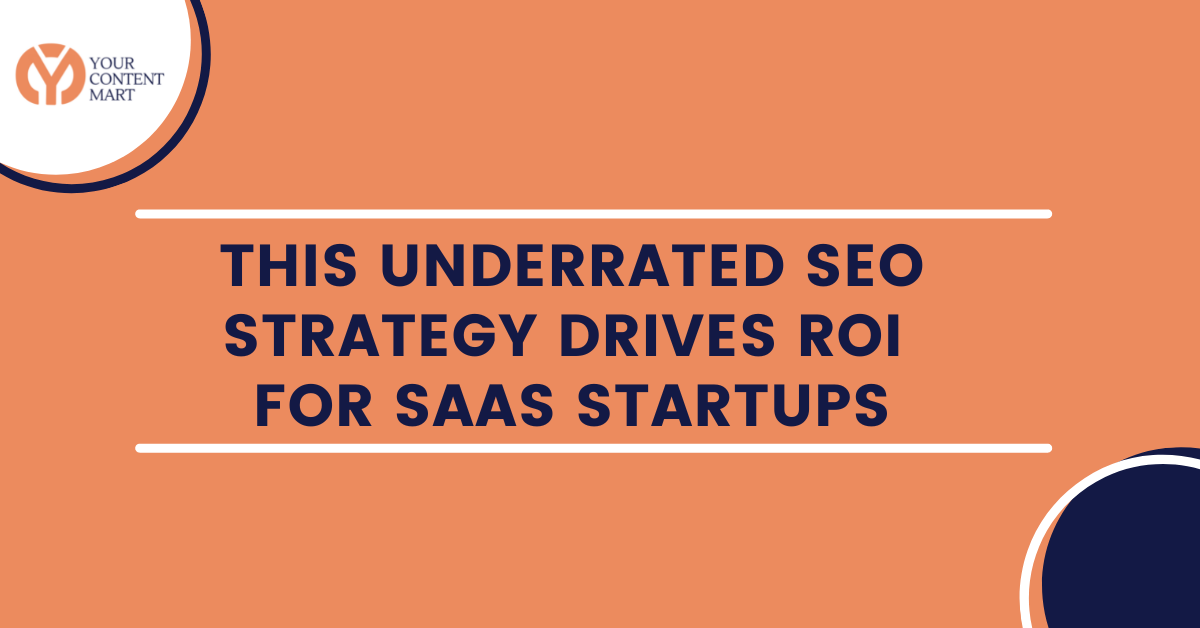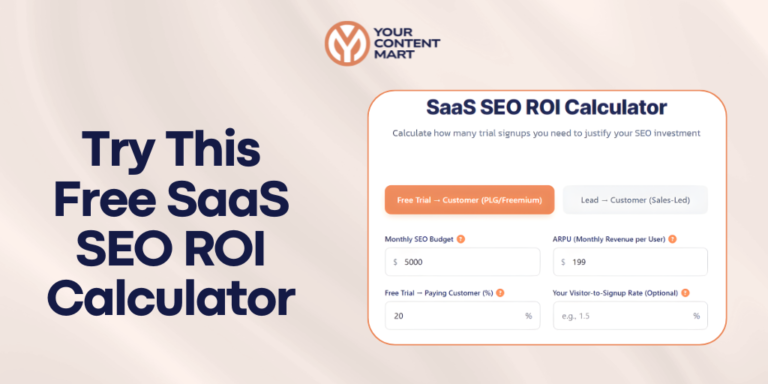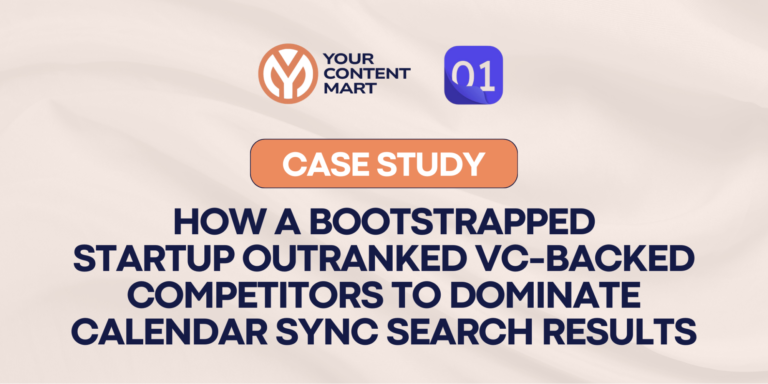Last updated on September 14th, 2025
Most marketing experts say that SEO shouldn’t be a priority for SaaS startups.
Here are some of their arguments:
- SEO is a competitive channel, and it’s difficult for SaaS startups to get results from it.
- SEO doesn’t drive immediate results. So, SaaS startups shouldn’t focus on it.
- As a SaaS startup, Google doesn’t trust you, so it might take 6-12 months before you start ranking.
- As a startup, you most likely haven’t established Product-Market Fit (PMF), so it won’t make sense to invest in SEO yet.
- You can’t acquire users directly from SEO content pieces.
For me, I believe that while SEO is becoming more saturated by the day, you can still succeed with it even as a SaaS startup.
I wrote this post to share why I think so. Plus, what I recommend that you should do to get results from this channel.
Here’s what you’ll learn after reading this post:
- Why SEO should be a priority for SaaS startups
- The biggest SEO mistake that SaaS startups make
- What SaaS startups should focus on to get results from SEO
- 4 ROI-driven SEO strategies that are proven to work for SaaS startups.
Note: If you’d like to learn how to drive qualified traffic, acquire more signups, and grow MRR for your SaaS startup, download our content marketing playbook for SaaS startups. If you’d like us to implement this SEO strategy for your SaaS startup, then feel free to book a call on our Free Content Analysis Page.
TABLE OF CONTENTS
Why SaaS Startups Should Make SEO a Priority From Day One
If you’re yet to implement SEO as a SaaS startup, you’re leaving so much on the table.
The reason is simple…
Most people searching for the solution your software offers do not know that you exist.
So, they won’t visit your beautifully-designed website to find out.
Instead, they’re actively searching online (especially on Google) to see if they can find a solution to their pain points.
If you aren’t investing in SEO, chances are that you’d lose out on the over 6 billion searches that are happening on Google every single day.
That’s not all. Here are some other reasons I recommend that SaaS startups invest in SEO.
1. SEO is the Most Affordable and Sustainable Distribution Channel
As a startup, you don’t want to invest in a distribution channel that will cost you an arm and a leg.
When compared to other distribution channels, SEO trumps them all in this regard.
Take, for instance, your primary distribution channel right now is Facebook Ads. Let’s say that the Cost Per Click (CPC) in your industry is around $3.
This means that if you want 1000 people to visit your website from Facebook (not take action), you will spend around $3,000 for that Ads campaign.
In most cases, you have to run multiple campaigns to get results.
Not only that, if you want your target audience to be visiting your website from Facebook, you must continue running the same Ads.
As soon as you stop running Ads, you won’t get website visitors from Facebook.
With SEO, this isn’t the case.
Even though the initial investment in SEO might be higher when compared to Facebook Ads, you’ll realize that it’s cheaper in the long run.
Here’s an example of a client we recently worked on their content marketing campaign.

Their investment in SEO is already paying off three months after we hit publish on one of their posts.
Right now, they’re ranking in position #6 on the SERPs for the main keyword.
They’re also getting about 8,000 website visitors monthly from an initial investment of $5,000 per month.
Going by the previous CPC of $3, they’d have to spend $24,000 to generate this amount of traffic from Facebook every month.
The best part…
All things being equal, they’ll rank higher on the SERPs and get more website visitors from Google without paying any recurring fee.
2. SEO Results Compound Over Time
Most marketers who say that SEO isn’t a wise investment for SaaS startups argue that results from that channel take time.
Of course, that’s true to a large extent.
Our experience (as I’ll share with you shortly) shows that you can get reasonable results from SEO in the first few months of your investment.
Now, let’s even agree that SEO takes time before seeing results. However, the good thing about it is that the results compound over time (irrespective of the keyword you’re targeting).
While it’s understandable that SaaS startups need to increase revenue to remain in business or prove to investors that they made a wise decision, it makes sense to invest in SEO nevertheless.
This is because investment in SEO helps your business in the long run if you’re in this for the long haul.
Truth is…
Even if you don’t rank for that keyword today, what happens if you occupy the top spot 6-12 months after?
Or even two years after.
Here is a quick example…
Around 2010, Moz published its beginners’ guide to SEO. According to the Wayback Machine, this is what the page looked like about nine years ago.
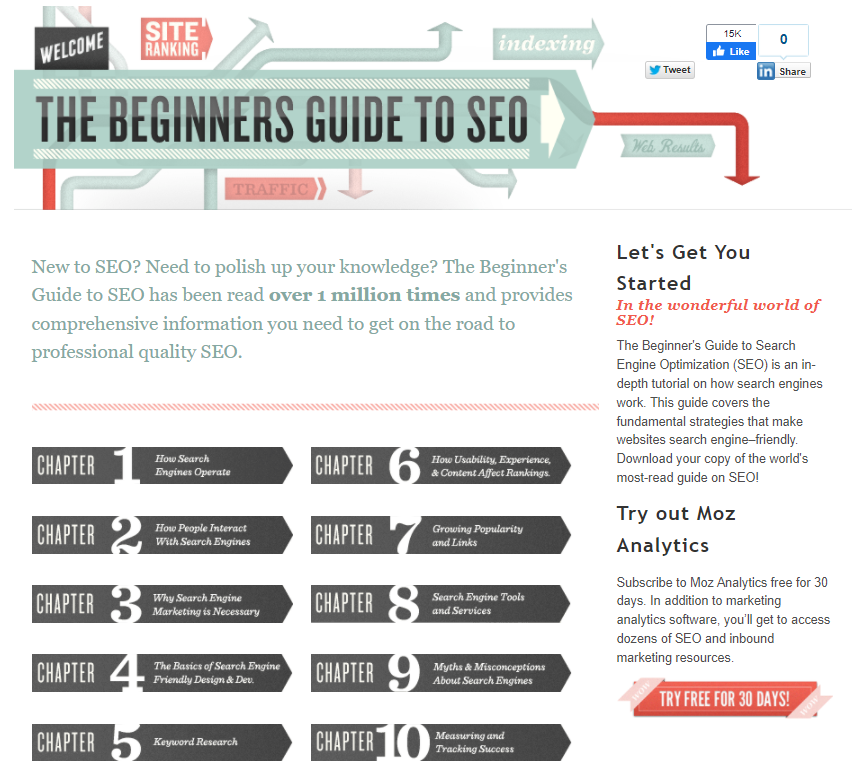
Even though the article was published over a decade ago, it still drives qualified traffic to date.
According to Ahrefs, that page alone:
- Ranks for over 20,000 organic keywords
- Has acquired over 377,000 backlinks
- Generates about 70,000 organic traffic visitors monthly
- Costs around $238,000 monthly if they were to invest in PPC Ads.

Now imagine for a second that Moz decided not to invest in this SEO over a decade ago because they felt that the company was still a startup.
Do you think they’ll get this kind of result? Absolutely, No!
Even though the SEO game has changed drastically in the last decade, it’s still worth it for SaaS startups to focus on it today.
Want us to implement the ROI-driven content marketing framework for your SaaS startup? Schedule a free discovery session to see if we’re a good fit.
3. SEO Traffic is Highly-qualified
Most distribution channels, such as Facebook, Google, Twitter, Instagram, YouTube, etc., have targeting options.
With this, you can optimize your Ads to reach the exact people you want to target (aka your target audience).
For instance, with Twitter Ads, you can target followers of a specific brand or individual.
So, if you’re running Twitter Ads to target content marketers, you can target followers of brands like “Content Marketing Institute,” “HubSpot,” “Jeff Bullas,” and so on.
Despite this targeting option, chances are that most people who see your Ads aren’t interested in your product.
That’s not the case with SEO.
Truth is…
If you can write high-quality SaaS content that solves this and rank high on Google, you’ll have a flock of qualified prospects visiting your website daily.
Now that you have an idea of why you should go all-in with SEO as a SaaS startup, let me share with you what to avoid to get results from this channel.
The Biggest SEO Mistake That SaaS Startups Make
Even though SEO is becoming more saturated by the day, you can still succeed with it as a SaaS startup.
I’m sure you’re wondering…
How is that possible when competing against well-funded companies with high domain authority, hiring the best talent in the world, and outspending their competitors?
I get your point, and I’ll explain shortly.
Here is the truth…
Instead of focusing on SEO strategies that will move the needle business-wise, they chase high-volume keywords that are supersaturated and hard to rank for.
This, to me, is the biggest mistake that SaaS startups make.
Here is an example to buttress my point…
Let’s say you just launched an SEO software for ecommerce companies.
What most SaaS startups do is target Top of the Funnel (ToFu) keywords like:
- SEO
- Ecommerce SEO
- Keyword research
- SEO best practices
- Link building.
And so on.
Truth is…
If you’re a B2B SaaS startup prioritizing keywords like these, you’ll end up not getting results from SEO.
The reasons aren’t far-fetched…
First, these are competitive keywords that the top guns in the SEO industry are already ranking for.
The keyword “ecommerce SEO” has websites like Crazy Egg, Bigcommerce, Backlinko, Shopify, Ahrefs, Neil Patel, and so on ranking on the first page.
Ahrefs estimates that it is super hard to rank for, and you’ll need at least 224 websites linking to you to stand a chance of ranking on the first page of Google for it.

So going after this keyword and outranking the top websites on the SERPs will be a tall order. If it ever happens, it’ll most likely take months and years of investing time and huge resources.
Two, ToFu keywords like these would most likely generate tons of traffic that don’t lead to ROI for your business in any way.
Put yourself in the shoes of the person searching Google for “What is SEO?”
Do you think that person is looking to buy an SEO software for their ecommerce company?
Most likely not.
Instead, they’re trying to educate themselves about SEO.
The person could be a college student who just heard the term SEO and decided to Google what it means.
Here is what the top-ranking article on the SERPs cover for this keyword.
- What Is SEO / Search Engine Optimization?
- How does SEO work?
- Why is SEO important for marketing?
- How can I learn SEO?
- Search Engine Land’s Guide To SEO
As you can see, the article is for informational purposes only.
You might also be wondering…
Why are big companies targeting these keywords?
If it isn’t working, they won’t be going after them, right?
Sure, I get your point.
But the truth is…
Matured SaaS companies have the resources to go after competitive keywords, even if it’s not generating any revenue for them right now.
Does that mean you shouldn’t target high-volume keywords?
Of course, you can, but that shouldn’t be your top SEO priority when starting.
Otherwise, you’ll continue complaining that SEO doesn’t work while your competitors acquire more users for their startups through it.
So, what SEO strategy should you leverage as a SaaS startup?
Let’s get to it.
The SEO Strategy To Focus On To Drive Business Results as a SaaS Startup
As a SaaS startup, you should focus on SEO strategies that impact your bottom line.
The reason is simple…
Your marketing budget is most likely not on the high side. So, it’ll be a tall order to compete on high-volume ToFu keywords when starting.
This is what we refer to as ROI-driven SEO at our agency.
Here is the premise behind that framework.
We use this framework at our agency, and it’s working well for our clients.
Here’s why we believe so much in it and highly recommend it.
Why ROI-driven SEO is the Best Approach for SaaS Startups
This tweet by Dev Basu, the CEO of Powered by Search captures why we believe that SaaS startups should focus more on ROI-driven SEO.

We focus on ROI-driven SEO when developing the organic strategy for SaaS startups.
As I mentioned earlier, it helps you gain some quick wins. Not only that, but with it, you’ll be able to validate this marketing channel fast.
That way, you can get more buy-in from the stakeholders in your company.
Here are some reasons we recommend this approach instead of the over-used approach of targeting high-volume keywords.
1. Rank Quickly for Your Target Keywords on Google

If you target a high-volume keyword with top competitors in your niche already ranking for it, you’ll most likely remain on the tenth page of Google for long.
In most cases, you’ll need hundreds of backlinks before you can do that successfully.
This isn’t the route to take if you want to get SEO and content marketing results as a startup.
In contrast, if you target MoFu and BoFu keywords, you’d most likely start ranking on the first page of Google within a few weeks or months.
2. Drive Qualified Traffic
Most ToFu keywords only drive tons of traffic that aren’t qualified.
In most cases, those keywords target readers who are just sourcing information online about a new term they just came across and not looking for a solution to the problems they’re facing.
That way, you can drive hot (and qualified) prospects to your website directly from Google.
3. Acquire User Signups and Paying Customers
Most SEOs and marketers emphasize acquiring organic traffic for the sake of it alone.
They make it seem like acquiring millions of visitors to your website is all you need to grow your website.
But guess what?
That isn’t the case.
Here is a fact…
Traffic acquisition is a means to an end, not the end itself.
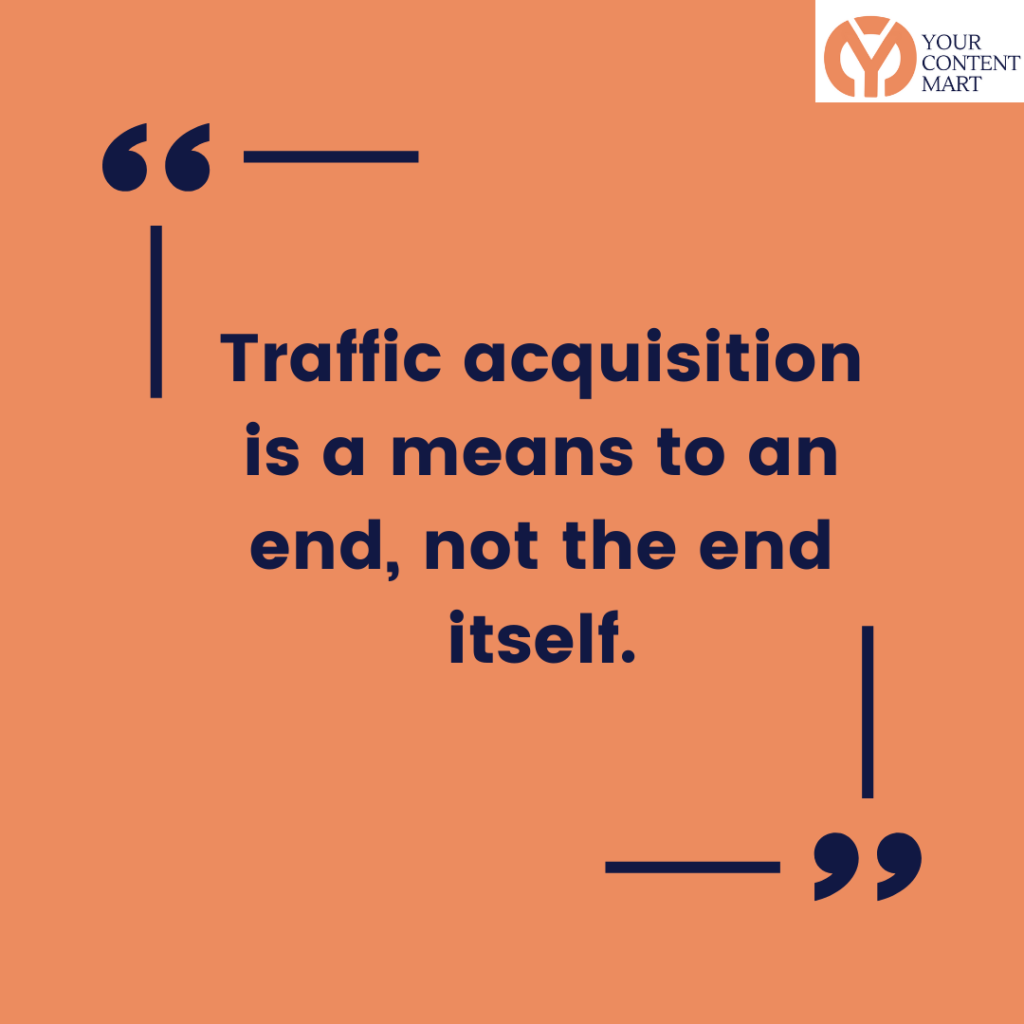
Let’s say your website generates about 10,000 organic traffic visitors monthly, and only 0.5% of that traffic converts into user signups.
This means that at the end of the month, you’ll end up getting 50 new signups for your business.
On the other hand, if you generate about 1,000 organic traffic visitors monthly, and about 20% of that traffic converter into user signups. In this case, you’ll end up getting 200 new signups every month.
As you can see, you can generate more leads with less traffic. This is why focusing on ROI-driven SEO strategies is crucial for startups.
4. Less Competition from the Top Guns in Your Industry
Most competitors (especially the big SaaS companies) underrate this strategy.
Here is why…
The keywords have zero or mini search volume in most SEO tools.
Hence it’s a huge opportunity that you can leverage as a startup.
At this point, you’re probably wondering.
What are some examples of ROI-driven SEO?
Okay, let’s get to it.
Want us to implement the ROI-driven content marketing framework for your SaaS startup? Schedule a free discovery session to see if we’re a good fit.
4 ROI-Driven SEO Strategies That Are Proven To Work For SaaS Startups
These ROI-driven SEO strategies work for SaaS startups. Learn more about them below and start implementing them in your business if you aren’t doing so yet.
1. Use Cases and Features SEO
Most prospects search for your SaaS use cases and features more than you can ever imagine.
By optimizing for these keywords, you stand a chance of meeting their immediate needs.
To get this right, ask yourself this question:
What are the specific use cases and features of our SaaS product?
Once you’ve identified them, create landing pages (most preferably) targeting them and optimize them for search engines.
An excellent example of a SaaS startup that does this well is Veed.
This and other strategies helped the company grow to $10M+ ARR and has now raised $35,000,000 from Sequoia.
If you check Veed’s website, you’ll see that they have several landing pages targeting the use cases and features that their SaaS solves.
Some examples include:
- Intro maker
- Outro maker
- Educational video maker
- Instagram Video Maker
- GIF Maker
- Video Resume Maker
- Lyric Video Maker
- Explainer Video Software
- Slideshow Video Maker
- TikTok Video Editor
As you can see, these keywords are ultra-specific, and anyone searching for them is highly qualified and most likely looking for a solution related to what Veed offers right now.
Put yourself in the shoes of someone searching Google for “Tiktok video editor.”
They most likely want to upload a video on Tiktok and need a software to edit it before doing so.
By going after this keyword, Veed can attract people ready to use a software like theirs now.
Right now, they occupy the number 1 position for this high-intent keyword.

Not only that, they’re targeting a keyword that would most likely lead to conversions and ROI for the business in the long run.
Veed has 121 use cases and feature pages on its website.
In total, they drive around 61,000 organic traffic visitors every month, according to Ahrefs.

As you can see, use cases and features SEO is a strategy you should leverage to get business results as a SaaS startup.
2. Comparison [X Vs Y] Posts
Let me ask you a question.
The last time you were undecided about a product to buy (due to the many options available), what keywords did you search for on Google?
I’m pretty sure that you compared the different products before making a buying decision.
That’s exactly what your prospects do before becoming a user of your software.
This is where creating comparison posts comes in.
With this content type, you compare your SaaS to the top competitors in your niche. That way, you can show them the specific features of your software.
This strategy is two-fold.
One, you create comparison posts comparing your company and its top competitors.
Let’s say that I’m doing SEO for Sendfox. I’ll use Google to identify some comparison posts to go after.
A quick Google auto-suggest search shows the following:

As you can see, some keywords to go after include:
- Sendfox vs. Aweber
- Sendfox vs. Convertkit
- Sendfox vs. Mailchimp
- Sendfox vs. Sendinblue
- Sendfox vs. GetResponse
- Sendfox vs. Activecampaign
- And so on.
The second part of the strategy involves comparing two or three company competitors.
Still using the examples above, some keywords I’ll target include:
- Aweber vs. Mailchimp
- Convertkit vs. GetResponse
- Sendinblue vs. Aweber
- ActiveCampiagn vs. Mailerlite
- Mailchimp vs. Convertkit
- And so on.
Here is the most interesting part…
The competition for these keywords is non-existent in most cases.
This is because most growth-stage and matured SaaS brands don’t go after them.
If you check the “Sendfox vs Mailchimp” keyword on Google, here’s what the SERPs look like:
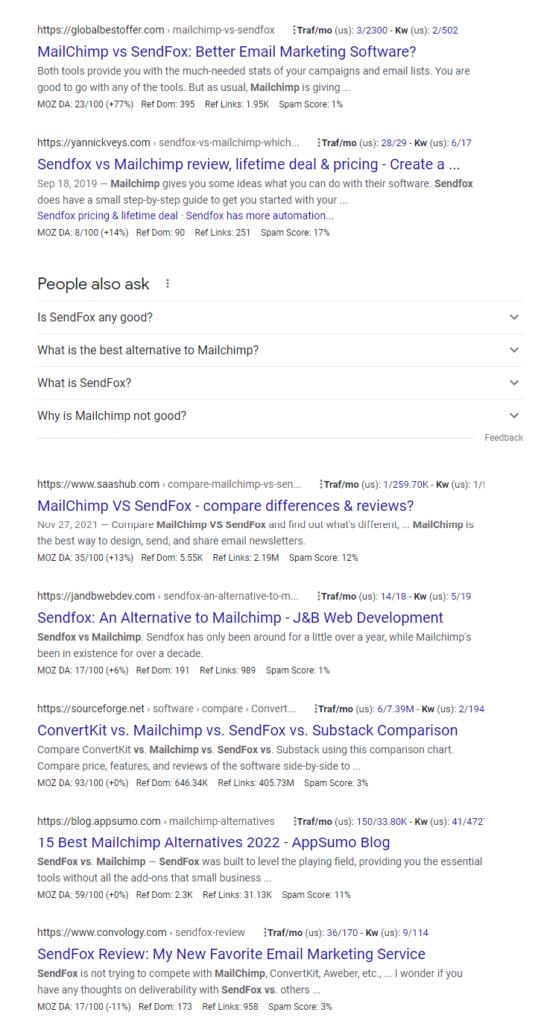
As you can see, some ranking websites on the SERPs include:
- Global Best Offer
- Yannick Veys
- SaaShub
- Jandbwebdev
- Sourceforge
- And so on
You stand a better chance of acquiring users and paying customers directly from your content pieces by targeting these keywords.
3. Alternative Posts
Some months ago, we published an “alternatives” post for a client.
Less than a month after publishing the article, we ranked in the top 3 positions on Google.
Here’s the most interesting part…
That keyword got over 12,000 impressions and 322 clicks from Google in one month.
That’s not all…
It generated 50+ conversions (user signups) for our client in the same period.
This is why this strategy works.
Let’s say you got disappointed by a company, and you want to switch to another. What will you most likely search for on Google?
Chances are that you’ll be on the lookout for alternatives to that company, right?
This is where alternative pages come in.
As a SaaS startup, you should target and create alternative pages for your top competitors.
Let’s say you’re competing in the SEO industry; some alternatives page you could create include:
- Semrush alternatives
- Ahrefs alternatives
- Moz alternatives
- Spyfu alternatives
- Mangools alternatives
- And so on
Like the previous example, most established SaaS brands do not target keywords like these.
Hence, it’s a huge opportunity that you should leverage.
Take the “Moz alternatives” keyword as an example.
Here’s what the SERPs look like for this keyword right now.

By targeting and ranking high for these keywords on Google, you’ll become top of mind for your competitors’ customers who are looking to switch.
Want us to implement the ROI-driven content marketing framework for your SaaS startup? Schedule a free discovery session to see if we’re a good fit.
4. Best X JBTD Posts
If someone searches for the solution you offer but knows nothing about your software, what keywords will they type on Google?
Those keywords and phrases are your Jobs To Be Done.
Most users looking to sign up for a tool they can use would most likely include the prefix “best” before keywords like this.
This is where the “Best X JBTD pages” come in.
Friday App is an excellent example of a SaaS startup that excelled at using this strategy (before it closed down).
And by going after these keywords, they drove about 100,000 organic traffic visitors every month from Google.
As a remote work tool, here are some best X JBTD pages that they targeted and ranked high for:
- Best daily planner apps
- Best digital planners
- Best digital journals
- Best online to-do lists and apps
- Best online daily checklists
- Best organization apps
- Best productivity tools
- Best personal management tools
- Best website blockers
- Best pomodoro apps
Take the keyword “Best Planner App” as an example.
Put yourself in the shoes of someone searching Google for it. What do you think is going on in their mind?
They’re looking for several best planner apps that they can use. Chances are that this person knows exactly what they’re looking for but has no idea of tools (software) they can use for that purpose.
Right now, Friday occupies the top spot on Google for this keyword which has a monthly global search volume of about 6,000, according to Ahrefs.

As you can see, best X JTBD SEO is a strategy you should leverage to rank high for high-quality keywords on Google.
There you have it…
4 ROI-driven SEO strategies you can focus on as a SaaS startup.
You can rank faster, drive qualified traffic, acquire more users, and grow MRR with these.
Don’t Sleep On SEO as a SaaS Startup
If you’re a SaaS startup, don’t sleep on SEO.
Truth is…
Most marketing experts say that you shouldn’t focus on SEO.
But as I’ve shown you in this post, that’s not true.
SEO is the best distribution channel out there. Here are some advantages of going all-in with it.
One, investment in SEO pays you dividends for months and years to come.
And if you’re in business for the long haul, you understand that this is important.
Two, the best form of traffic is from SEO.
If someone visits your website because you’re ranking on Google for a specific keyword, then they’ve pre-qualified themselves.
And if they have a burning pain point that keeps them awake at night, and you solve that with your content, you become their hero for life.
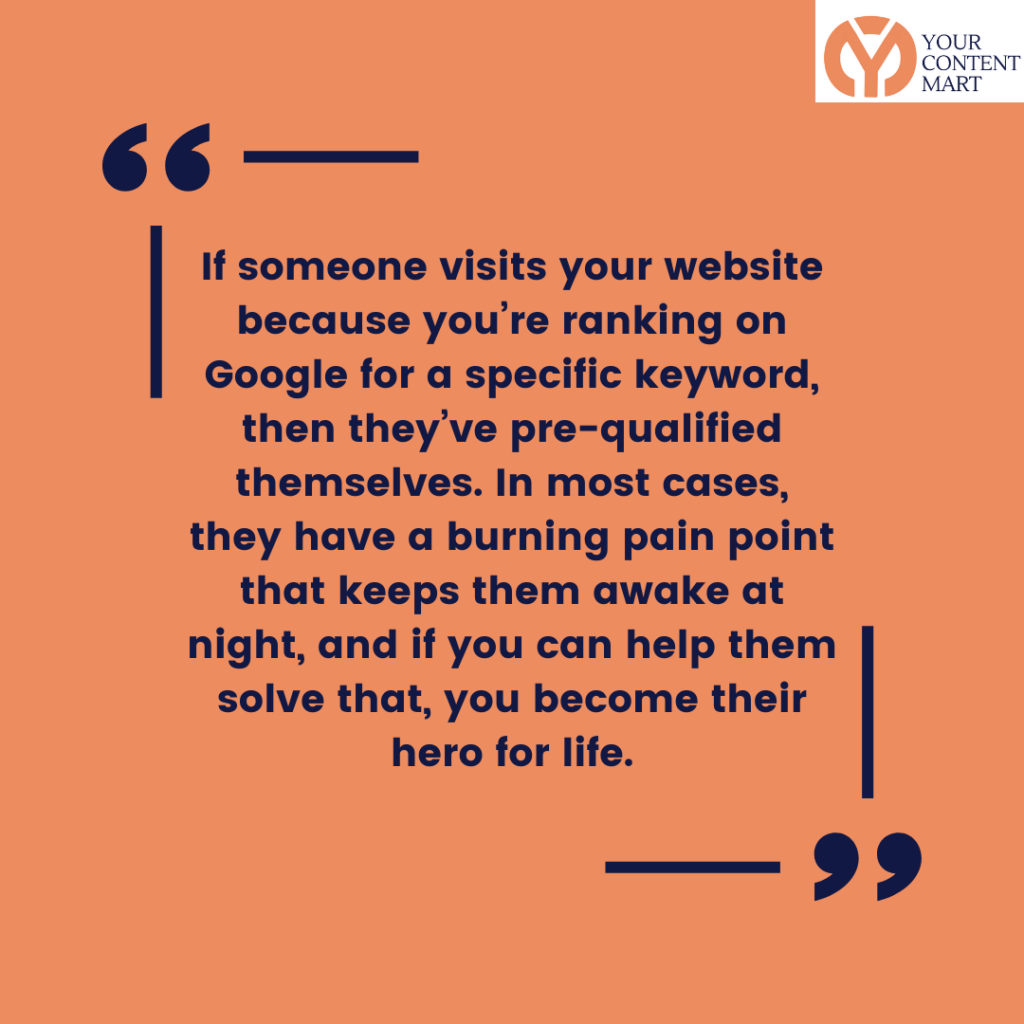
And if you leverage product-led content marketing as we recommend at our agency, you can even acquire user signups directly from your SEO articles.
Three, SEO traffic is mostly free traffic. You’re only expected to put in minimal work monthly or yearly to maintain your ranking positions.
If you compare this to, say, “organic social,” where you have to show up daily to get results, you’d see that SEO is a better investment.
This doesn’t mean that you should leverage other distribution channels.
My point is…
At Your Content Mart, we help B2B SaaS startups acquire more users and grow MRR using ROI-driven content marketing. If you’d like us to implement this framework for your SaaS startup, schedule a free discovery session to see if we’re a good fit.

